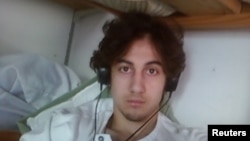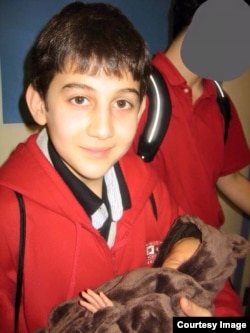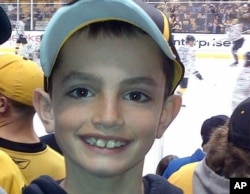He’s a charmer. He’s a slacker. He’s bright. He’s a victim of culture shock, a broken family and a domineering older brother. He’s a murderer. He’s a terrorist.
That’s the picture presented in recent days of Dzhokhar Tsarnaev as his defense lawyers neared the end of their effort to save their client’s life. As early as Monday, the defense may rest their case and put their faith in the 12-person jury, which will decide whether he should die or live.
Tsarnaev, 21, was convicted last month of 30 terrorism and other related charges for his role in the April 2013 Boston Marathon bombing. U.S. law requires that the jury must return a unanimous decision in order to execute a person, and it is that chance – that one juror will decide against the death penalty – where Tsarnaev’s lawyers are placing their hopes.
Three people died in the attack, including an 8-year-old boy, and more than 260 were wounded. Tsarnaev and his older brother, Tamerlan, killed a police officer several days later just prior to a car chase and shootout that left Tamerlan dead.
Penalty Phase
The two-part trial entered the “penalty” phase April 21, as prosecutors sought to paint Tsarnaev as a willing accomplice in the worst terrorist attack on U.S. soil since Sept. 11, 2001.
Defense lawyers portrayed their client as a malleable participant, under the sway of Tamerlan, who they said was the mastermind and leader.
“The whole goal of the defense is … to make the jury see the defendant as a vulnerable human being,” said Robert Dunham, executive director of the Washington-based Death Penalty Information Center.
“The jury doesn’t have to like him,” he said. “The jury doesn’t have to want to have him over to their house for dinner. They just have to decide that putting him away in a dark hole for the rest of his life is an acceptable punishment.”
As with the previous phase, the courtroom has been whipsawed by testimony, by turns infuriating, wrenching, maddening or saddening.
Prosecutors stunned spectators and jurors in their opening arguments for the death penalty by juxtaposing photographs: of the youngest victim, 8-year-old Martin Richard, and that of Tsarnaev, making an obscene gesture to a video camera in the prison cell where he’s being held.
“This is Dzhokhar Tsarnaev, unconcerned, unrepentant and unchanged,” federal prosecutor Nadine Pellegrini told jurors.
Courtroom Tears
On Monday, less than two weeks later, the courtroom filled with sobbing, when Tsarnaev’s aunt, Patimat Suleimanova, flown from Russia, wracked with tears, tried to speak about her nephew whom she hadn’t seen in more than a decade.
During the weeks that the trial has been ongoing, Tsarnaev, who spent his childhood shuttling between Russia and Kyrgyzstan and then his formative years in a three-bedroom, third-floor apartment in Cambridge, Massachusetts, has been largely impassive and at times appearing bored.
On Monday, after listening to his aunt, he himself broke down for the first time, rubbing his eyes with his fists and openly weeping.
Not long after, as he was being led from the courtroom during a break, he blew a kiss to a cousin who was in attendance.
More than 40 witnesses appeared during the penalty phase, including some of Tsarnaev’s former school teachers and college friends, some crying openly. During her appeareance in court on April 29, one former teacher, Becki Norris, smiled at Tsarnaev, and he returned the smile.
Later, she posted a photograph on Facebook of 12-year-old Tsarnaev holding her newborn daughter.
“When you care deeply for someone, that doesn't stop even if they do unfathomably horrible things. We humans are really good at holding two irreconcilable ideas in our psyches at the same time. Yes, he did the unforgivable. And yes, I still love him. And – this one is hard to fathom, I know – he still needs love,” Norris wrote on her Facebook page.
Death penalty decision
The decision by the Obama administration to seek the death penalty for Tsarnaev has been controversial. Massachusetts state law does not allow for capital punishment, but Tsarnaev is being tried in federal court.
Support for the death penalty in the state has never been strong, and public opinion polls taken by Boston-area media in the months prior to and during the trial have shown dwindling enthusiasm.
On the eve of the final phase, the Boston Globe published a front-page letter from Martin Richard’s family, in which they called for sentencing Tsarnaev to life in prison.
“As long as the defendant is in the spotlight, we have no choice but to live a story told on his terms, not ours,” the family wrote. “The minute the defendant fades from our newspapers and TV screens is the minute we begin the process of rebuilding our lives and our family.”
At the beginning of Tsarnaev’s trial, his defense, led by renowned lawyer Judy Clarke, conceded his guilt, in what appeared to be a strategy focused more on saving his life.
“This is the theory: that no person is only the worse thing they’ve done in their life,” said Quin Denvir, a former federal defender who worked with Clarke in gaining a life prison sentence for Theodore Kaczynski, the “Unabomber,” in a federal trial in 1998.
“It’s all part of letting the jury seeing the person as a human being, not just the perpetrator of a crime, but as a fully developed human being, with strengths and weaknesses,” Denvir said.
In addition to calling relatives and experts on Chechnya’s tortured history, lawyers have called witnesses to argue that the prison where Tsarnaev would live out the rest of his life – the U.S. Penitentiary Administrative Maximum Facility in Colorado – would be harsh and unforgiving.
It is “a mechanism to cut off an inmate’s communications with the outside world,” defense witness Mark Bezy testified on Wednesday.
Tsarnaev’s parents, Anzor and Zubeidat, were not called to testify. Both now live in Dagestan, the Russian region bordering Chechnya, and have not returned the United States since just after Tsarnaev’s initial court appearance in 2013.
Russian Hunger For News
With the Tsarnaev family’s ties to Russia and the North Caucasus, there’s been intense interest in the trial for many Russians, according to Alexei Venediktov, the editor-in-chief of Ekho Moskvy, an influential, independent radio station and Web site in Moscow.
The proceedings, however, have received virtually no coverage in the Russian news media, nearly all of which is state-controlled. Venediktov told VOA that’s probably because of growing concern from the Kremlin about stability in the long-troubled North Caucasus.
“This process carries an unpleasant association, I think, for the leadership, in particular, of the Russian Federation, and therefore, I think, it’s possible there’s been embargo on news,” he said.
He also said support is growing in Russia to bring back the death penalty, and were the Boston jury to sentence him to death, it would have a significant impact on the Russian debate.
“I think the jury’s verdict will be actively discussed in Russia if it ends up being the death penalty,” he said.
Tlisova reported from Boston; Eckel reported from Washington.







